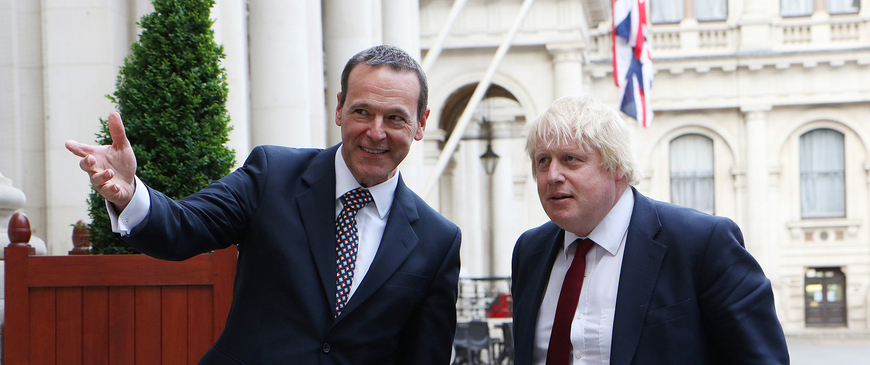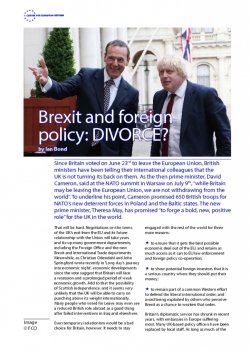
Brexit and foreign policy: Divorce?
Since Britain voted on June 23rd to leave the European Union, British ministers have been telling their international colleagues that the UK is not turning its back on them. As the then prime minister, David Cameron, said at the NATO summit in Warsaw on July 9th, "while Britain may be leaving the European Union, we are not withdrawing from the world". To underline his point, Cameron promised 650 British troops for NATO’s new deterrent forces in Poland and the Baltic states. The new prime minister, Theresa May, has promised "to forge a bold, new, positive role" for the UK in the world.
That will be hard. Negotiations on the terms of the UK’s exit from the EU and its future relationship with the Union will take years and tie up many government departments, including the Foreign Office and the new Brexit and International Trade departments. Meanwhile, as Christian Odendahl and John Springford wrote recently in ‘Long day’s journey into economic night’, economic developments since the vote suggest that Britain will face a recession and a prolonged period of weak economic growth. Add to that the possibility of Scottish independence, and it seems very unlikely that the UK will be able to carry on punching above its weight internationally. Many people who voted for Leave may even see a reduced British role abroad as a good thing after failed interventions in Iraq and elsewhere.
Even temporary isolationism would be a bad choice for Britain, however. It needs to stay engaged with the rest of the world for three main reasons:
- to ensure that it gets the best possible economic deal out of the EU, and retains as much access as it can to EU law enforcement and foreign policy co-operation;
- to show potential foreign investors that it is a serious country where they should put their money;
- to remain part of a common Western effort to defend the liberal international order, and avoid being exploited by others who perceive Brexit as a chance to weaken that order.
Britain’s diplomatic service has shrunk in recent years, with embassies in Europe suffering most. Many UK-based policy officers have been replaced by local staff. As long as much of the substantive business with EU member-states could be done through their representatives at the EU, or at monthly meetings of EU foreign ministers, these cuts did not matter much.
The UK will need to do much more networking in #EU capitals to protect its interests.
For the next few years, however, the UK will need to do much more networking in EU capitals to protect its interests. As it loses influence in Brussels, it will have to work harder with national governments to defend British interests in areas from aviation security to agricultural trade. It will need nimble and well-connected embassies to spot when a bilateral deal could create a valuable ally; or when a UK demand that makes perfect sense domestically could turn a potential friend into an enemy. The ‘divorce settlement’ with the EU will be approved by a qualified majority of the 27 EU member-states; but an agreement on the future relationship requires unanimity, so even one offended former partner could derail it. David Davis, the new Brexit secretary, has spent years fighting the EU (including as Europe minister under Prime Minister John Major); now he and his ministerial colleagues will have to put all their efforts into mollifying their EU partners.
The new government will also need to preserve what it can of its role in EU law enforcement and judicial co-operation, and in foreign policy co-ordination. This may be easier than getting access to the European single market: there is clear benefit to both sides from minimising changes in the security field, and there are fewer special interest groups (apart from international criminals and terrorists, perhaps) lobbying for the Commission to drive a hard bargain with the UK. Cameron and May were right during the referendum campaign to stress how EU membership boosted British security. The threat to the UK from terrorism and from conflicts on Europe’s periphery will be no less after Brexit. At the same time, the rest of the EU will want to continue to benefit from Britain’s police and intelligence capabilities, and from its diplomatic network.
While it is sorting out its relations with the EU, the UK will also have to work hard to mitigate the economic damage caused by leaving the EU. The new international trade secretary, Liam Fox, will have to persuade investors and key trading partners that Britain is a big enough and stable enough economy to make co-operation worth their while – though he will be hamstrung initially by the fact that the UK will not have the right to strike independent trade deals until it has left the EU. Most investors will be wary of promising Britain anything until there is clarity on the UK’s access to the single market and its position in the WTO, but Fox and his officials cannot wait until then before starting to woo foreign companies and sovereign wealth funds.
Finally, the UK will need to keep the closest possible relations with like-minded countries, inside and outside the EU, in order to prevent less friendly countries exploiting its weakness and isolation. Russia has already signalled its expectation of more flexibility from the UK. Putin’s press spokesman said after the referendum: "We hope that in the new reality, an understanding of the necessity of building good relations with our country will prevail".
After Brexit, the foreign secretary will not attend Foreign Affairs Council meetings when the EU discusses how to respond to Russian assertiveness in Eastern Europe, or Chinese territorial claims in the South China Sea; the Foreign Office will not have staff seconded to the European External Action Service, able to influence EU foreign policy priorities. As countries like Norway or Canada could testify, even third countries with very similar values and perspectives to those of EU members have to work very hard to have any impact on EU policy.
But the UK will still have assets (including a permanent seat in the UN Security Council) of use to Western partners, and interests it shares with EU members. It has every reason to show that it is not a weak link in the Western consensus. The new foreign secretary, Boris Johnson, implied during the referendum campaign that the EU was to blame for Russia’s invasion of Ukraine. He needs to dispel quickly any idea that he will now part company with like-minded democracies on foreign policy issues. He should throw himself enthusiastically into working with other Western foreign ministers to solve international problems.
Brexit will damage both Britain’s international standing and the ability of the EU to influence the world around it. But its impact on both parties will be a lot worse if the UK gratuitously distances itself from its partners. Britain and the EU do not have to love each other, but they must still work together.
Ian Bond is director of foreign policy and defence at the Centre for European Reform.

